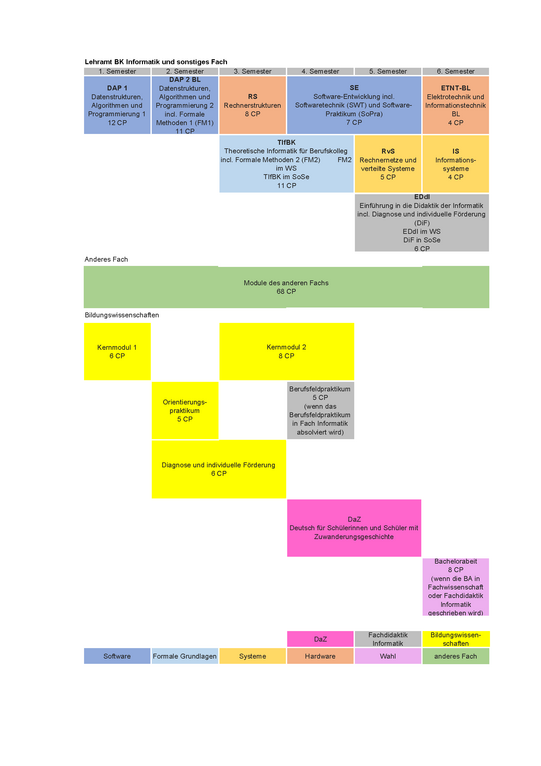Teacher training bachelor's program in vocational college subject computer science
You can study Computer Science at the Technical University of Dortmund as a teaching subject for the teaching profession at grammar schools and comprehensive schools and for the teaching profession at vocational colleges. As a teacher training student, you will take part in the same courses in Computer Science (with the exception of subject didactics) as students on the Bachelor's degree courses in Computer Science and Applied Computer Science and thus receive a high-quality specialist education.
This Bachelor's degree course is followed by the consecutive Master's degree course for teachers. Completion of the Master's degree course corresponds to the first state examination and enables you to enter the preparatory service (traineeship). Choosing computer science as a subject prepares you for teaching at both a technical and an economic vocational college.
The teacher training bachelor's degree course is a full-time, on-campus course with a standard period of study of six semesters (three years) and is completed with a Bachelor of Arts (B.A.) or Bachelor of Science (B.Sc.) degree, depending on the subject chosen. It starts in the winter semester.
The course language is German.
Directly to the application in the TU Dortmund University campus portal
Below is a sample study plan with its various modules. You can find further study plans here.

In Computer Science, the courses prepare you for the broad range of topics that you will teach as a teacher at a vocational college.
In the Software Cycle courses, you will learn how to develop software. The spectrum ranges from creating small programs and investigating the efficiency of certain algorithms to developing larger projects in a team.
In the Formal Methods and Theoretical Computer Science for Vocational College courses, you will learnformal methods that you will later apply and teach yourself in order to analyze problems and solve them as efficiently as possible.
You will gain an insight into how computers work in the lecture Computer Structures. The Electrical and Communication Engineering course prepares you for teaching at technical vocational colleges if you have not already chosen electrical engineering as another subject. (You can choose modules that prepare you for teaching at a vocational college for business in the consecutive Master's degree program).
In Central Systems of Computer Science, you will learn about computer networks and distributed systems, information systems (databases) and, depending on your subject combination, operating systems. (You may need to choose operating systems in the consecutive Master's degree program).
In order for you to be able to complete the practical semester of the consecutive Master's degree course at various vocational colleges, the curriculum requires you to already have a broad subject base in the Bachelor's degree course. The elective options are therefore only available to you on the Master's degree course.
Finally, the courses on subject didactics prepare you for your role as a computer science teacher at a vocational college.
Computer science is a general education subject in all types of schools. At vocational colleges, computer science is also part of the vocational knowledge taught. The unique features of computer science include the formal handling of data and information - comparable to the physics formula system for forces and energy - as well as the analysis of problems, solutions and their efficiency.
An important question in computer science is which problems can be solved automatically and, if so, how efficiently. At the same time, computer science also offers students the opportunity to test their ideas in practice by designing, programming and evaluating computer programs.
"Computational thinking is a fundamental skill for everyone, not just for computer scientists. To reading, writing, and arithmetic, we should add computational thinking to every child's analytical ability." (Jeanette M. Wing)
You will not only apply the knowledge gained in lectures in practice groups, but also in the internships integrated into the curriculum. In the software internship, you will work on challenging software projects in groups to gain valuable programming experience and skills such as teamwork and project management.

![[Translate to English:] [Translate to English:]](/storages/zentraler_bilderpool/_processed_/d/f/csm_Informatik_275ba5e5fc.jpg)

![[Translate to English:] [Translate to English:]](/storages/zentraler_bilderpool/_processed_/1/b/csm_Figuren-nachdenklich_e2435967dd.jpg)
![[Translate to English:] [Translate to English:]](/storages/cs/_processed_/6/f/csm_teamwork1_e113f5f13b.png)
![[Translate to English:] [Translate to English:]](/storages/cs/_processed_/e/1/csm_header_ee496f74bf.png)